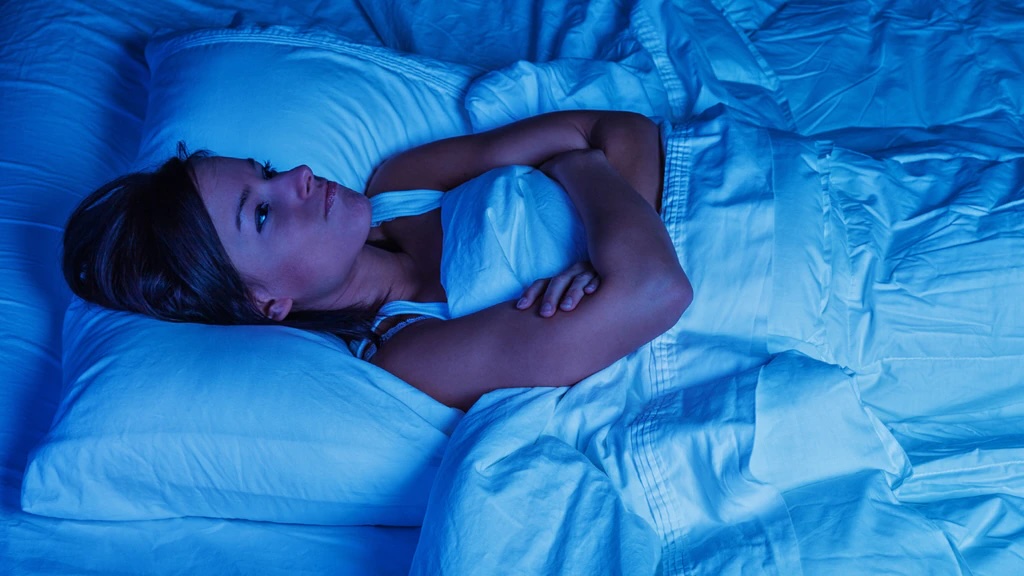
Melatonin controls our sleep-wake cycle, and a synthetic form of it has been created. Image: iStock
Body+Soul’s resident sleep expert Olivia Arezzolo shares everything you need to know, and a touch more, on our natural sleepiness hormone, melatonin.
Melatonin is a natural hormone that promotes sleep. It is produced by the pineal gland and controls the sleep-wake cycle. When our levels of melatonin are high, we naturally feel sleepy, and when levels are low, we naturally feel awake.
Since falling asleep and staying asleep is a challenge faced by so many, scientists have created a synthetic version of melatonin which comes in the form of supplements, sprays and gummies.
If you’ve ever wondered if you should take melatonin, how often, and what the potential side effects are, this is the perfect place to start.
Melatonin for treating insomnia
If you are struggling with symptoms of insomnia, such as difficulties falling asleep, or staying asleep, then melatonin could be a great supplement for you.
An academic paper published this year explored melatonin as a first-line treatment and the first recommendation by doctors for insomnia.
Melatonin’s primary function is to support the initiation of sleep, and those who struggle to fall asleep within two hours of their ideal bedtime, or have delayed sleep-wake disorder, have shown significant improvements in their symptoms by taking melatonin.
As noted in a 2018 clinical study, individuals using 0.5mg of melatonin, over the course of 28 days, fell asleep 34 minutes earlier, woke up 24 minutes earlier and slept 26 minutes longer compared to those using a placebo.

Melatonin is a powerful supplement for sleep, especially for those with insomnia, shift work and jet lag.
Melatonin for shift work management
The body is not designed to sleep throughout the day. While this may be a requirement for your work, it comes with significant consequences for your sleep.
A 2010 academic review highlighted that shift workers typically sleep two to four hours less, have less REM sleep (usually promoting memory and emotional regulation), and self-report their sleep as less restorative.
Due to the negative impacts of less and poorer quality sleep, in 2007, the International Agency for Research into Cancer (IRAC) identified shift work as a probable carcinogen and cause of cancer.
As such, it’s fortunate that melatonin has been able to support sleep of shift workers: a 2008 clinical trial study found a medium dose of 5mg could reduce the time taken to fall asleep by 78 per cent, which may otherwise limit total sleep time too.

The body is not designed to sleep throughout the day. Image: iStock
Melatonin for jetlag management
A 2002 clinical review offered good news for frequent travellers by specifying that melatonin has been ‘remarkably effective in preventing and reducing jet lag, especially when travelling westward (e.g. from Sydney to London), and when crossing five or more timezones.
Endogenous or external melatonin is helpful because changing timezones to such an extensive degree naturally desynchronises the sleep-wake clock.
While you may not be familiar with this terminology, in essence, this simply means the signals for sleep which is darkness outside, no longer exist at the same time, thus leaving your body fatigued when it’s light outside.
Therefore, by taking melatonin at the correct time in your new timezone, you reset this cycle, and enable your body to feel naturally fatigued and be able to sleep easier in your new location.

Have you changed timezones? Taking melatonin in your new timezone can reset your sleep cycle and enable your body to feel naturally fatigued in your new location. Image: iStock
Who shouldn’t take melatonin?
Those who are planning to become, or are, pregnant or breastfeeding should avoid taking melatonin as research currently indicates it may not be safe.
Similarly, those with autoimmune disorders, epilepsy, kidney or liver problems should also be cautious and raised with your doctor before you start any supplement regime.
How much melatonin should you take?
The dose of melatonin is dependent on your reason for taking it. For those struggling with signs of insomnia, this 2022 study mentioned previously found that doses ranging from 0.1-10mg have been effective and vary according to how severe your symptoms are and how problematic your sleep is.
For jetlag, the same study established that doses of 5mg were more effective than 0.5mg, and the same evidence was found for the management of shift work.
Fortunately, since melatonin is available by prescription only, you don’t have to play guessing games. Your physician will guide you to your optimal dose and should monitor your symptoms over time to see how your body is responding.

A physician will guide you toward your optimal dose of melatonin. Image: iStock
When do you take melatonin?
Melatonin works best when consumed one to two hours before bedtime.
How often should you take melatonin?
It is ok to take melatonin every night, for a one to three week period, only, which gives you circadian rhythm time to reset and you can fall asleep with ease, and sleep well overall.
While taking melatonin for longer than this period isn’t harmful, as expressed below, the shorter period is recommended for best results.
As such, in conjunction with melatonin, you should be leveraging longer term, sustainable sleep strategies, such as a quality bedtime routine, to ensure your sleep continues to improve.
What are the negative side effects?
Mild, ‘non-significant’ adverse effects have been seen in clinical trials to date, such as feeling overly sleepy in the morning, headaches, dizziness.
For this reason, it’s important to stick to the recommended dosage provided by your physician, and not more.
Despite a common misconception, there is no evidence to suggest that artificial melatonin disrupts our natural melatonin production.

There is no evidence that artificial melatonin disrupts our natural melatonin production. Image: iStock.
What about OTC melatonin infused gummies, sprays and supplements?
You’ve probably noticed that melatonin is now infused in many sleep-promoting products, from gummies to sprays and more.
Typically, the dosage is low (0.1-1mg), which enables it to be included in the product without a prescription.
That said, a 2017 study found actual melatonin content varied from 83 per cent to +478 per cent to what was advertised on the label, and inter variability in a singular product differed by as much as 465 per cent.
As such, it is imperative to have a health professional monitor you, even if you are only taking melatonin in non-prescription supplements.
Final thoughts on melatonin
Melatonin is a powerful supplement for sleep, especially for those with insomnia, shift work and jet lag.
With such a wealth of evidence, as a professional, I do advocate for short-term or periodic use on the condition that your usage is monitored by an expert and doctor, and is used alongside other longer-term strategies.
+ show Comments
- Hide Comments
add a comment